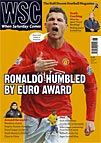 The national team have already failed in World Cup qualification and the China Super Leage, only four years old, has been dropped from TV. Gary Bowerman reports on a sport in chaos
The national team have already failed in World Cup qualification and the China Super Leage, only four years old, has been dropped from TV. Gary Bowerman reports on a sport in chaos
The Chinese are deeply ashamed by football. Since China’s first, and only, appearance at a World Cup finals, in South Korea and Japan in 2002 – where they lost all three group matches without scoring a goal – the domestic game’s reputation has plummeted. The national team have slumped to 98th place in the FIFA rankings, while the top domestic division, the China Super League (CSL), has been plagued with damaging scandals.
In 2008, China failed meekly in the early qualifying rounds for the 2010 World Cup. Worse still, the Olympic team were humiliated on home territory during the Beijing Olympics, culminating in a 2-0 defeat to a young Belgium team during which two Chinese players, including captain Zheng Zhi, were sent off. The national press, which frequently berates the nation’s senior footballers – whom most Chinese regard as petulant, overpaid and lazy – castigated the team’s performances as a national disgrace.
In November, the Wuhan Guanggu club, located in central China, withdrew from the 16-team CSL in protest at an eight-match suspension handed to their player Li Weifeng for fighting. The Chinese Football Association responded by cancelling the club’s registration, meaning they can no longer compete in any division.
Shortly afterwards, the state-owned national broadcaster, China Central Television (CCTV), dropped the CSL from its schedules, prompted by a mass brawl between players and officials of local rivals Beijing Guo’an and Tianjin Kangshifu. Following a controversial last-minute red card for a Beijing player, enraged fans also blocked the stadium exits and surrounded the Tianjin team bus before armed police had to intervene.
CCTV’s decision came with two rounds of the season remaining – and was loaded with political significance. China’s economy is being severely affected by the global recession, resulting in collapsed export orders for manufactured goods. This year, some 67,000 businesses, most in low-skilled manufacturing industries, have closed. China’s social security minister called the unemployment situation “grim”.
The government, which has bathed in the glow of three decades of spectacular growth, is now confronted by strikes and unrest. It could no longer tolerate ill-disciplined footballers brawling on national television – particularly when violent demonstrations outside closed factories are spreading nationwide. “The present situation of Chinese football has hurt everybody,” said Jiang Heping, controller of sports channel CCTV 5. He added that the decision to drop CSL coverage showed the broadcaster was being “responsible to the country and to the people”. Jiang’s tirade did not stop there. He furiously reproached China’s professional footballers, questioning their influence in the much hyped “harmonious” society: “Some players lack basic professional ethics. Their behaviour is embarrassing for TV audiences and embarrassing for football.”
The public fall from grace of the CSL – launched with 12 city-based franchises in 2004 – has become a national heartache. The Beijing Evening News even ran a headline asking: When will Chinese soccer stop bringing shame? Five years of persistent corruption scandals, financial mismanagement, on- and off-the-pitch violence and poor standards of play have made the CSL unpopular with fans who eagerly tune in to live matches from Europe. A recent online poll revealed that 65 per cent of respondents think the CSL is so poor that CCTV should have dropped its coverage sooner.
The list of recent scandals includes corrupt refereeing, match-fixing, illegal betting, violence against officials and drug use. One referee was sentenced to ten years in jail for accepting RMB 370,000 (£36,000) in bribes. In 2008, Beijing Guo’an’s former international defender Zhang Shuai was cited for “questionable behaviour” by a newspaper after reportedly being unable to account for a new car costing RMB 1 million and property worth more than RMB 10m. Even his club admitted that his salary did not yield purchasing power on this scale. The future for China’s national league now appears bleak.
On November 24, following the penultimate round of CSL matches, the state-run English-language China Daily newspaper published the weekend results from 12 global football leagues – but conspicuously omitted those from its own top division. For Chinese fans, the national team’s elimination from the World Cup and the CSL’s disappearance from television screens and newspaper pages simply means the heartbreak is hidden – but the pain continues.
From WSC 263 January 2009